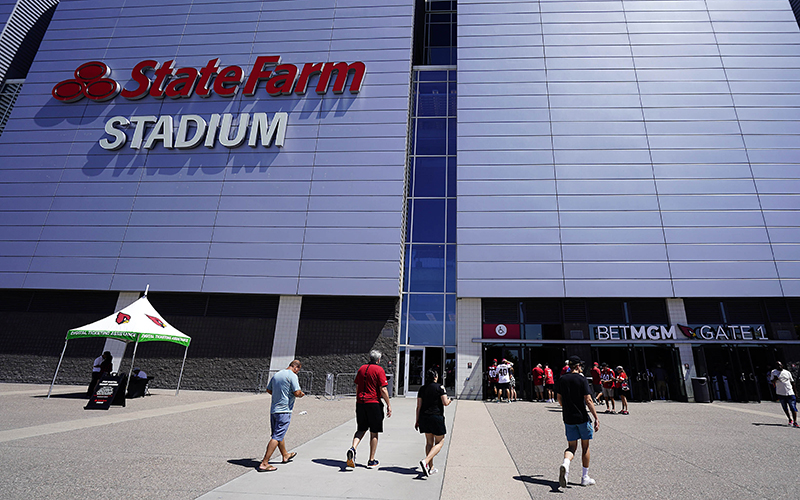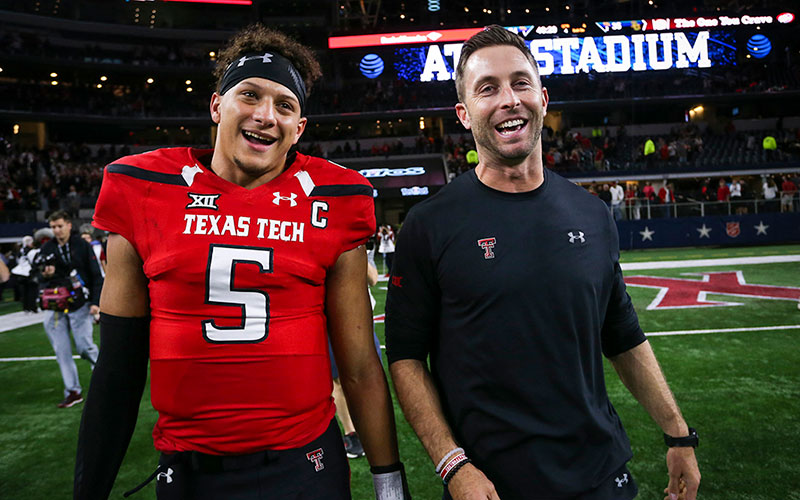
State Farm Stadium in Glendale, home of the Arizona Cardinals, is owned by the Arizona Sports and Tourism Authority, which in many ways limits the franchise’s revenue opportunities compared to other NFL teams. (Photo by Darryl Webb/AP/Shutterstock)
PHOENIX – The Arizona Cardinals placement in the Forbes annual NFL team value list mirrored the roller coaster of an offseason the franchise endured.
The offseason featured contract extensions for general manager Steve Keim and coach Kliff Kingsbury, a DeAndre Hopkins suspension, trading for wide receiver Marquise Brown and quarterback Kyler Murray’s contract extension saga.
Amid the twists and turns, the Cardinals’ value increased to $3.27 billion, a 23% increase from last year that made them the 47th most valuable sports team in the world, and the team generated $467 million in revenue in the 2021 season.
Yet the Cardinals dropped to No. 30 from No. 27 on the NFL team value list despite Arizona having eight Fortune 500 companies, including Freeport-McMoRan, Avnet and Carvana. In addition, the team improved each season since drafting Murray in 2019, while Phoenix, the fifth-largest city in the United States, is ranked 11th in overall television markets.
“The biggest factor that kind of strikes me with them being ranked so low is the fact that they’re in the Phoenix (designated market area),” said Arizona State University adjunct professor Todd Merkow, who has lived in Arizona for more than 20 years and has over 20 years of executive experience. “When you do a comparison and look at the other ones that are at the bottom, Buffalo and Jacksonville, those are all small-market teams. They’re not large markets. So, honestly, I think some of it is defined unfairly because there’s clearly a ton of value here in the marketplace.”
Most of Arizona’s value came from revenue shared among NFL franchises because all 32 teams equally share over 70% of football-related revenue. Market size (10.2%), stadium (7.6%) and brand (4.9%) accounted for the remaining value, and the Cardinals ranked 25th in brand, 29th in market and 30th in sport and stadium.
“The way the Cardinals are situated with their lease, they don’t have much of an opportunity to (increase stadium revenue) in terms of non-NFL events, ticket pricing and demand for premium seating,” Forbes writer Mike Ozanian said. “They are positioned in the bottom quartile of the NFL, so that’s why we value them where we do.”
The Arizona Sports and Tourism Authority owns State Farm Stadium and ASM Global operates the 63,400-capacity venue, which limits how aggressively the Cardinals can pursue non-football related deals. In comparison, the Dallas Cowboys, who operate AT&T Stadium through their owner Jerry Jones, can land a variety of sponsorship deals.
The Cardinals’ major sponsorships come from State Farm, University of Phoenix, Papa John’s, Hyundai, Gila River Casino, Desert Financial Credit Union, Anheuser-Busch InBev and BetMGM. Arizona signed an 18-year stadium naming rights deal with State Farm in 2018 for an undisclosed amount and a 15-year partnership in 2019 with Gila River Hotels & Casinos. Its previous stadium deal in 2006 with the University of Phoenix was worth $154.5 million.
Last season, the Cardinals generated $57 million in ticket sales and ranked No. 24 in fan attendance, averaging 62,622 fans per game. It was a 2.1% increase from the last time NFL stadiums had full-capacity crowds in 2019, when Arizona ranked 27th. In the last 10 years, Arizona has had the 15th best record in the NFL at 81-78-2.
“Even going back to the 90s, (the Phoenix designated market area) has always been considered a football town,” Merkow said. “Now, the market loves winning, and every one of these franchises have experienced significant swings and attention by the fans because of winning, but it is a football town.”
To prepare for the 2023 Super Bowl, the State Farm Stadium has undergone over $100 million in renovations. Changes include stadium club area and loft renovations, maintaining quality in the stadium and revising a parking lot, pedestrian tunnel, bridge and security structures. However, hosting the Super Bowl doesn’t guarantee a team’s growth in value.
“Teams don’t make money from having a Super Bowl,” Ozanian said. “That’s not going to really help the Cardinals, but if (they) improve (their) luxury suites and lease them out at higher prices, that will help (them).”
Still, Arizona can increase its valuation this season when HBO features the team on its in-season series of “Hard Knocks.”
“Being in the media and being on something like (‘Hard Knocks In Season: The Arizona Cardinals’), while it’s probably annoying for the players and coaches, (it) can be a big boost to a brand if they’re presented properly, and more people understand the team and become more attracted to the athletes and their backstories,” said Patrick Walsh, an associate professor of sport management at Syracuse University.
Despite the low ranking amongst their peers, the Cardinals’ value continues to increase year-over-year like the rest of the NFL.
“Even if the Cardinals are considered ‘low’ on this list from a financial value perspective, if you look overall from a team value perspective across all sports, they’re still going to be in the top 50 of the most valuable sports teams worldwide because the NFL, itself, is such a powerful brand, and franchise values have grown so significantly,” Walsh said.
A team’s valuation does not mean that is its true value. For example, Forbes valued the Denver Broncos at $3.75 billion in 2021, but Walmart heir Rob Walton purchased the franchise in June for $4.65 billion.
“Valuation only means anything on realization, and we just had a realization with the Denver Broncos,” Merkow said. “What’s relevant is what’s real. If the Bidwill family were ever to sell that team, then we would know what the real value is because the market will have spoken.”
Here is how the rest of the list unfolded (based on the 2021 NFL season):

